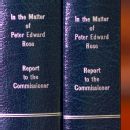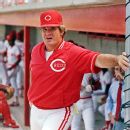Embattled MLB legend Pete Rose dies at 83


ESPN News Services
Sep 30, 2024, 07:30 PM ET
NEW YORK — Pete Rose, baseball’s career hits leader and fallen idol who undermined his historic achievements and Hall of Fame dreams by gambling on the game he loved and once embodied, has died. He was 83.
Stephanie Wheatley, a spokesperson for Clark County in Nevada, confirmed on behalf of the medical examiner that Rose died Monday. Rose was found by a family member. The coroner will investigate to determine the cause and manner of death, but there are no signs of foul play, according to ABC News. Over the weekend, Rose had appeared at an autograph show in Nashville with former teammates Tony Perez, George Foster and Dave Concepcion.
For fans who came of age in the 1960s and 1970s, no player was more exciting than the

1 Related
Baseball commissioner Peter Ueberroth, watching from New York, declared that Rose had “reserved a prominent spot in Cooperstown.” After the game, a 2-0 win for the Reds in which Rose scored both runs, he received a phone call from President Ronald Reagan.
“Your reputation and legacy are secure,” Reagan told him. “It will be a long time before anyone is standing in the spot where you’re standing now.”
Four years later, he was gone.
On March 20, 1989, Ueberroth (who would soon be succeeded by A. Bartlett Giamatti) announced that his office was conducting a “full inquiry into serious allegations” about Rose. Reports emerged that he had been relying on a network of bookies, friends and others in the gambling world to place bets on baseball games, including some with the Reds.
Rose denied any wrongdoing, but the investigation found that the “accumulated testimony of witnesses, together with the documentary evidence and telephone records reveal extensive betting activity by Pete Rose in connection with professional baseball and, in particular, Cincinnati Reds games, during the 1985, 1986, and 1987 baseball seasons.”
Betting on baseball had been a primal sin since 1920, when several members of the Chicago White Sox were expelled for throwing the 1919 World Series — to the Cincinnati Reds. In the decades following, Dodgers manager Leo Durocher and Detroit Tigers pitcher Denny McLain were among those suspended for gambling, and Willie Mays and Mickey Mantle were reprimanded for associating with casinos, even though both had retired years earlier.
In August 1989, at a New York news conference, Giamatti spoke some of the saddest words in baseball history: “One of the game’s greatest players has engaged in a variety of acts which have stained the game, and he must now live with the consequences of those acts.” Giamatti announced that Rose had agreed to a lifetime ban from baseball, a decision that in 1991 the Hall of Fame would rule left him ineligible for induction. Rose attempted to downplay the news, insisting that he had never bet on baseball and that he would eventually be reinstated.
Rose’s story eventually changed with him admitting in a 2004 autobiography that he bet on baseball, including Reds games, though said he never bet against his team.
“I don’t think betting is morally wrong. I don’t even think betting on baseball is morally wrong,” Rose wrote in “Play Hungry,” a memoir released in 2019. “There are legal ways, and there are illegal ways, and betting on baseball the way I did was against the rules of baseball.”
Shortly after the ban went into effect, Rose was also convicted of tax evasion and spent a number of months in prison. Also, in 2017, an unidentified woman alleged in a court document that Rose had a sexual relationship with her for several years in the 1970s, beginning before she turned 16. Rose acknowledged he had a sexual relationship with the woman but said he believed that it started when she was 16 — which is the legal age of consent in Ohio.
Rose was a Cincinnati native from a working-class neighborhood whose father, Harry Francis Rose, like the father of Mantle, taught his son to be a switch-hitter. Rose mastered his skills with a broom handle and a rubber ball, thrown to him by his younger brother, Dave.
Pete Rose graduated from high school in June 1960. He flew to Rochester, New York, two days later, and then rode a bus some 45 miles to Geneva, home of the Reds’ level D minor league team. By 1962, he had been promoted to level A, in Macon, Georgia. He batted .330 and vowed to displace Reds second baseman Don Blasingame in 1963, telling a reporter, “I’m going to be on his heels.”
Blasingame was with the Washington Senators by midseason and Rose was a phenomenon: “Charlie Hustle,” Yankees pitcher Whitey Ford reportedly called him, mockingly, after watching him hurry to first upon drawing a walk in spring training. Rose hit .273 as a rookie and, starting in 1965, batted .300 or higher 14 out of 15 seasons. He was so dependable that in 1968, the “Year of the Pitcher,” he led the league with a .335 average, one of three batting titles.
In his post-baseball life, he did make it to a few honorary associations. The Reds voted him into the team’s Hall of Fame in 2016, the year before a bronze sculpture of Rose’s iconic slide was unveiled outside of Cincinnati’s Great American Ball Park.
Rose was never inducted into Cooperstown, but his career was well-represented. Items at the Baseball Hall include his helmet from his MVP 1973 season, the bat he used in 1978 when his hitting streak reached 44 and the cleats he wore, in 1985, on the day he became the game’s hits king.
The Associated Press contributed to this story.